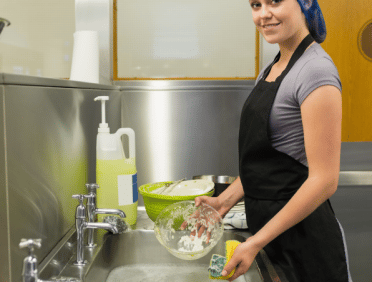What is Food Safety?
Food safety refers to the measures taken to ensure that food is free from harmful contaminants and is safe for consumption. In the UK, food safety is highly regulated and monitored to protect public health.
The Food Standards Agency (FSA) is the main regulatory body responsible for ensuring food safety in the UK. The FSA sets and enforces strict standards for food production, processing, and handling to minimise the risk of contamination and illness.
The FSA works with local authorities and food businesses to conduct inspections, monitor compliance with food safety regulations, and investigate foodborne outbreaks. The agency also provides guidance and advice to consumers on how to handle and prepare food safely.
Food businesses in the UK are required to have food safety management systems in place, such as Hazard Analysis and Critical Control Points (HACCP), to identify and control potential hazards in food production and processing.
Overall, food safety is taken seriously in the UK, and the FSA and other regulatory bodies work diligently to ensure that food is safe and free from harmful contaminants.
Why is Food Hygiene Important?
Food hygiene is critical to ensuring that the food we eat is safe and free from harmful contaminants that can cause illness. Poor food hygiene practices can lead to the spread of foodborne illnesses such as Salmonella, E. coli, and Norovirus, which can have severe health consequences and even be life-threatening in some cases.
Maintaining good food hygiene practices is essential at every stage of the food chain, from production and processing to storage, preparation, and service. This includes keeping food at the correct temperatures, preventing cross-contamination between raw and cooked foods, and ensuring that equipment and utensils are clean and sanitary.
Poor food hygiene practices can also lead to food spoilage, resulting in waste and financial losses for businesses. Additionally, outbreaks of foodborne illness can have a significant economic impact on the food industry and damage consumer confidence in food safety.
What are the legal requirements for food safety and hygiene?
The legal requirements for food safety and hygiene vary by country, but in the UK, there are specific regulations that food businesses must follow to ensure that food is safe for consumption. The Food Safety Act 1990 and the Food Hygiene (England) Regulations 2013 are two key pieces of legislation that set out the legal requirements for food safety and hygiene in the UK.
Under these regulations, food businesses must ensure that all food is produced, processed, and stored in a hygienic manner to prevent contamination and spoilage. They must also have in place a food safety management system, such as HACCP, to identify and control hazards throughout the food production process.
Food businesses must train their staff in food safety and hygiene, maintain records of food safety practices, and cooperate with food safety authorities during inspections and investigations.
Failure to comply with these regulations can result in legal action, including fines and closure of the business. It is, therefore, essential for food businesses to adhere to the legal requirements for food safety and hygiene to protect public health and avoid legal consequences.
The importance of staff training
There is no denying that staff training underpins the importance of food hygiene but it is designed to ensure that staff understand what is expected of them. Therefore, the aim of staff training is to build awareness of;
Clean and Sanitisation
Staff training in food hygiene helps improve awareness of the importance of cleanliness and sanitation. Training enables staff to learn about potential hazards, understand the significance of a clean and hygienic environment, and prevent contamination and foodborne illnesses. With training, staff can identify areas for improvement, develop necessary skills, and take responsibility for maintaining high hygiene standards. Consistent good hygiene practices can help reduce the risk of contamination and foodborne illnesses, improve reputation for food safety, and avoid legal action and financial losses.
Correct use of disposable gloves
The correct use of disposable gloves is essential to maintaining food hygiene standards in the food industry. Gloves can act as a barrier between the food handler and the food, preventing contamination from microorganisms that may be present on the skin or under the nails. However, if not used correctly, gloves can actually increase the risk of contamination. If gloves are not changed frequently or if the same pair of gloves is used for multiple tasks, they can spread bacteria and viruses. Therefore, it is crucial that food handlers are trained on the correct use of disposable gloves, including when to change them, how to dispose of them safely, and when they are necessary.
Food allergen
Training on food allergens is crucial to ensure that food handlers understand the risks associated with allergenic foods and know how to prevent cross-contamination. Food allergies can cause severe and even life-threatening reactions in some individuals, making it vital that all food handlers are aware of the allergenic ingredients in the food they prepare and serve. Training can help food handlers identify allergens, understand the risks of cross-contact, and learn how to prevent contamination through good hygiene practices. By receiving training on food allergens, food handlers can ensure that they are providing safe and suitable food for all consumers, including those with food allergies.
Click here to download our FREE allergen awareness poster:
Food equipment cleaning
Cleaning food equipment is essential to prevent the buildup of harmful bacteria and ensure food safety. Failure to properly clean and sanitise equipment can lead to cross-contamination and increase the risk of foodborne illness. Food handlers should be trained on how to effectively clean and sanitise equipment to prevent cross-contamination. This includes using the correct cleaning and sanitising agents, ensuring that all equipment surfaces are thoroughly cleaned, and following the appropriate cleaning and sanitising procedures.
By training staff on the proper cleaning of food equipment, food businesses can maintain high hygiene standards, prevent food contamination, and protect the health of consumers.
Click here to download our FREE kitchen cleaning poster
Causes of food poisoning
Training to understand the causes of food poisoning is crucial to help food handlers prevent outbreaks of foodborne illness. By understanding the causes of food poisoning, such as bacterial contamination, cross-contamination, or improper food storage, food handlers can take steps to prevent these issues from occurring. This includes practising good hygiene, following proper food storage and cooking procedures, and monitoring food temperatures.
When food handlers are trained to recognize the symptoms of food poisoning, they can take action quickly to prevent further contamination and ensure that proper steps are taken to avoid outbreaks. By emphasising the importance of food safety, training on the causes of food poisoning can help protect the health and well-being of consumers and maintain the reputation of food businesses.
Click here to download our FREE food contamination poster
Food poisoning symptoms
It is crucial for food handlers to receive training on food poisoning symptoms to identify potential outbreaks of foodborne illness. Recognizing signs such as nausea, vomiting, diarrhoea, and fever can help them take prompt action to prevent further contamination. Training on food poisoning symptoms emphasises the importance of food safety and encourages food handlers to maintain good hygiene practices and follow proper food storage and cooking procedures.
Food hygiene safety
Training on food hygiene safety is critical for food handlers to maintain high standards of cleanliness and sanitation. Proper training can help food handlers understand the risks associated with poor hygiene, such as contamination and foodborne illness, and learn best practices to prevent these issues.
By emphasising the importance of hygiene safety, training encourages food handlers to practise good personal hygiene, including handwashing, proper use of protective equipment, and maintaining clean and sanitised workspaces. This can help reduce the risk of cross-contamination and prevent the spread of harmful bacteria and viruses.
Food-borne germs and illnesses
It is essential for food handlers to receive training on foodborne germs and illnesses to prevent outbreaks of foodborne illness. By understanding the types of germs that cause food poisoning, such as bacteria, viruses, and parasites, food handlers can take steps to prevent the spread of harmful microorganisms. They can also learn how to properly store, handle, and cook food to minimise the risk of contamination.
Understanding the symptoms of foodborne illness is also critical, as it allows food handlers to recognize potential outbreaks and take swift action to prevent further contamination. By emphasising the importance of understanding foodborne germs and illnesses, training can help protect consumers and businesses from the serious consequences of foodborne illness.
HACCP – Hazard Analysis and Critical Control Points
Food handlers must receive proper training in HACCP (Hazard Analysis and Critical Control Points) to ensure that food products are safe for consumption and prevent contamination. The HACCP approach involves identifying potential hazards in each stage of food production, analysing them, and taking appropriate control measures. By training food handlers on HACCP principles, they can learn how to identify potential hazards and control them to prevent foodborne illnesses.
Understanding HACCP enables food handlers to take a proactive approach to food safety and avoid contamination before it occurs. By adhering to HACCP principles, food businesses can enhance their reputation for safe and quality products, protect consumers, and reduce the risk of legal and financial consequences associated with foodborne illnesses.
keeping food safe for consumers
Proper food safety training is essential for staff who handle food products to ensure the safety and quality of the food served to consumers. Foodborne illnesses can have severe consequences for consumers, including hospitalisation and even death. Training staff on how to keep food safe can help prevent contamination and minimise the risk of foodborne illnesses. Staff training can include proper food storage, handling, preparation, and cooking techniques, as well as the identification of potential hazards and the implementation of control measures.
By providing food safety training, businesses can reduce the risk of foodborne illnesses, protect consumers, and enhance their reputation for quality products. It also promotes a culture of food safety awareness among staff, encouraging them to adopt best practices to maintain high standards of food safety and quality. Overall, proper food safety training is essential for protecting public health and ensuring consumer confidence in the food industry.
People with high food risk
Training staff on how to deal with people with a high food risk is essential to ensure the safety of vulnerable consumers. People with high food risk, such as the elderly, pregnant women, and those with weakened immune systems, are more susceptible to foodborne illnesses. Therefore, staff must receive proper training to handle, store, prepare and serve food safely to these consumers. The training may include food temperature control, cross-contamination prevention, and allergen management. Staff must also be knowledgeable about different dietary requirements and restrictions, and how to communicate them effectively to kitchen staff.
Through providing this training, businesses can build a culture of inclusivity and ensure that all consumers are served with the same level of care and safety. Proper training can also minimise the risk of legal and financial consequences associated with foodborne illnesses. Overall, training on how to deal with people with a high food risk is essential for businesses to provide safe and quality products to all consumers.
Physical contamination of food
Preventing physical contamination of food is of utmost importance to ensure the safety and wellbeing of consumers. Food businesses must train their staff to prevent any foreign object from entering food products, be it during production, processing, or handling. This can be achieved through proper training that covers a range of topics, such as safe food handling practices, maintaining a clean and organised work environment, and the correct use of food equipment. Staff must also be taught how to identify potential sources of physical contamination and how to report them promptly to their supervisor.
Physical contamination can cause a range of health hazards for consumers, including injury, illness, or even death. It can also damage a business’s reputation and result in legal and financial consequences. Therefore, it is essential that businesses prioritise staff training on preventing physical contamination to avoid any mishaps. By instilling a culture of food safety and quality among staff, businesses can provide consumers with safe and healthy food products, build trust and loyalty, and promote long-term success.
Click here to download our FREE food contamination poster
Safe storing of foods
The safe storage of food is a critical aspect of food safety, and staff training is essential to ensure that food products are stored correctly. Improper storage can lead to the growth of harmful bacteria, which can cause foodborne illnesses. Staff training should cover topics such as temperature control, shelf life, and the correct use of storage containers. Properly trained staff should also be able to identify signs of spoilage, such as foul smells or mould growth, and know how to dispose of contaminated food safely.
The importance of training in safe food storage cannot be overstated. By adhering to proper storage practices, businesses can extend the shelf life of food products, minimise food waste, and avoid potential health hazards for consumers. Proper training can also help to reduce the risk of financial and legal consequences that can result from foodborne illness outbreaks.
Safe serving of foods
Ensuring the safe serving of food is crucial to maintain food safety and prevent the spread of foodborne illnesses. Staff training is essential to ensure that food is served at the correct temperature, using the proper utensils, and that it is protected from contamination. Training should cover topics such as personal hygiene, cross-contamination prevention, and the importance of using gloves, tongs, and other serving utensils to avoid bare-hand contact with food.
Proper training in safe serving practices can help to minimise the risk of foodborne illness outbreaks and protect the health of consumers. Staff must also be trained on how to identify symptoms of foodborne illnesses and how to respond appropriately.
The result of effective staff training
Effective staff training plays a critical role in ensuring food safety and protecting the health of consumers. By providing proper training, staff can develop a deep understanding of the importance of food safety, as well as the skills and knowledge required to maintain it. This, in turn, can help businesses to avoid foodborne illness outbreaks, protect their reputation, and maintain a loyal customer base.
Additionally, well-trained staff can help to minimise food waste and improve operational efficiency, leading to better financial outcomes. Ultimately, the result of effective staff training is a safer and more successful food business, one that prioritises the health and satisfaction of its customers while adhering to the highest standards of food safety.
Build a positive workplace environment
Effective staff training not only helps to ensure food safety but also creates a positive work environment that can enhance staff satisfaction, engagement, and retention. When employees receive proper training, they feel more confident in their abilities, which can lead to higher job satisfaction and better performance. Additionally, staff who are well-trained can contribute to a culture of teamwork, collaboration, and support, which can further improve morale and create a positive work environment.
Furthermore, investing in staff training demonstrates a commitment to employee development and growth, which can lead to greater loyalty and retention. Staff who receive regular training opportunities are more likely to feel valued and appreciated, leading to greater job satisfaction and reduced staff turnover.
In summary, effective staff training not only ensures food safety but can also create a positive work environment that benefits both employees and the business. It can improve staff satisfaction, engagement, and retention, leading to a more productive and successful team.
Improve staff efficiency
Staff training can improve staff efficiency by providing them with the necessary skills and knowledge to perform their tasks effectively and efficiently. By understanding the importance of food safety and proper procedures, staff can work more quickly and accurately, minimising the risk of errors and reducing the time needed to correct mistakes. Well-trained staff are also more likely to be proactive and take ownership of their work, identifying and resolving issues before they become problems. This can lead to improved productivity and reduced downtime, ultimately contributing to a more efficient and profitable business. Additionally, staff who are well-trained in multiple areas of the business can be cross-trained to perform multiple tasks, further increasing efficiency and flexibility.
Grow the food business reputation
Effective staff training can help improve the reputation of a business by demonstrating a commitment to providing high-quality products and services. Customers are more likely to trust a business that prioritises food safety and properly trains its staff to handle food safely. When employees are knowledgeable about food safety and hygiene, they are better equipped to handle any challenges that may arise, and customers will take notice. Positive customer experiences can lead to repeat business and recommendations, helping to build a strong reputation for the business. In today’s competitive market, a positive reputation is essential for success, and effective staff training can help businesses achieve this.
Help to reduce food waste
Proper staff training can contribute to reducing food waste by creating a culture of efficiency and waste reduction within the workplace. By emphasising the importance of food safety, staff are better equipped to handle food items properly, reducing the risk of spoilage or contamination. Additionally, when staff are trained to identify potential food waste, they are able to take action to prevent it. For example, they can monitor inventory levels, properly store food items, and utilise proper portion control. All of these actions can help to reduce food waste and contribute to a more sustainable business. By promoting a culture of waste reduction, businesses can not only reduce costs but also contribute to a more environmentally conscious society.
Help prevent food-related illness
By providing effective staff training on food safety, businesses can significantly reduce the risk of food-related illnesses. Staff members who are well-informed about food safety and hygiene procedures are better equipped to handle food safely, reducing the risk of contamination and foodborne illnesses. Proper training on the causes and symptoms of foodborne illnesses can help staff identify potential issues and take swift action to prevent outbreaks. In turn, this can prevent reputational damage to the business and help maintain customer trust. Furthermore, reducing the incidence of food-related illnesses can lead to cost savings for the business and help maintain a safe and healthy workplace for staff and customers alike.
Promote better food safety awareness
By investing in staff training on food safety, businesses can promote better awareness of food safety and hygiene practices among their employees. Regular training sessions can help to reinforce the importance of proper food handling and preparation, and equip staff members with the necessary knowledge and skills to maintain food safety standards. This can also help to create a culture of food safety awareness within the workplace, where all staff members are actively engaged in maintaining a safe and healthy food environment. Improved awareness of food safety practices can also lead to increased customer satisfaction and loyalty, as customers are more likely to return to a business that prioritises their health and wellbeing.
Promote staff empowerment
Staff empowerment through effective training can lead to improved job satisfaction, which in turn can result in increased productivity and better overall performance. When staff members feel confident and knowledgeable about their roles in ensuring food safety, they are more likely to take ownership and responsibility for their actions. This not only promotes better food safety practices but also encourages a sense of pride in their work and a commitment to the company’s values.
Empowered staff members are also more likely to communicate concerns or suggest improvements, leading to a culture of continuous improvement and innovation. As a result, effective staff training can promote staff empowerment, which can ultimately lead to a more efficient and successful food business.
Understanding the 4Cs of food hygiene
Food hygiene is an essential aspect of food safety, and it is vital to prevent the spread of foodborne illnesses. To achieve this, the four C’s of food hygiene must be taken into account. These are Cleaning, Cooking, Chilling, and Cross-contamination. Proper implementation of the 4C’s ensures that food is safe to eat and minimises the risk of contamination or illness. Understanding the 4C’s of food hygiene is crucial for anyone involved in food preparation or handling to ensure that they maintain a high standard of hygiene in the kitchen. By following the principles of the 4C’s, food handlers can ensure that they provide safe and hygienic food to customers.
Cleaning
Cleaning is one of the four key areas of food hygiene, referred to as the “4Cs.” It involves removing visible dirt and debris from surfaces, utensils used for food preparation and hands. Effective cleaning also involves using appropriate detergents and sanitizers to eliminate harmful microorganisms that may cause foodborne illness. Proper cleaning procedures should be followed to prevent cross-contamination between different food items, surfaces, and utensils. Staff should receive training on the correct methods for cleaning and sanitising to ensure a safe and hygienic food environment. Regular monitoring and record-keeping of cleaning activities can help identify areas for improvement and maintain a high level of cleanliness.
Click here to download our FREE kitchen cleaning poster
Cooking
Cooking is an essential process in food preparation that involves using the right temperature to ensure the food is safe for consumption. Proper cooking temperatures can kill harmful bacteria and pathogens, reducing the risk of food poisoning. The temperature at which food is cooked depends on the type of food being prepared. For instance, poultry and meat must be cooked at high temperatures to ensure they are safe to eat. It is crucial to use a food thermometer to measure the internal temperature of the food to ensure it is cooked to the appropriate temperature, reducing the risk of foodborne illnesses.
Click here to download our FREE key kitchen temperatures poster
Chilling
Chilling food is a critical aspect of food safety, and it involves keeping food at the appropriate temperature to prevent the growth of harmful bacteria. Refrigeration is one of the most effective ways to achieve this. Properly storing food in the refrigerator can help preserve its quality and prevent spoilage. It’s important to ensure that the refrigerator temperature is consistently below 5°C to keep food fresh and safe to eat. Moreover, it is essential to label and date all items stored in the refrigerator, so they are used before their expiration date.
Click here to download our FREE key kitchen temperatures poster
Cross-contamination
Cross-contamination occurs when harmful microorganisms from one food item are transferred to another food item. It can happen through direct contact, such as when raw meat touches cooked food, or through indirect contact, such as when utensils or surfaces are not properly cleaned. This can lead to foodborne illness and should be avoided by implementing proper food handling procedures. Staff training is essential to prevent cross-contamination in a food service environment, including proper hand washing, sanitising surfaces and utensils, and separating raw and cooked foods.
Click here to download our FREE food contamination poster
Food hygiene premises inspections
Food hygiene premises inspections are conducted by regulatory bodies to ensure that food businesses are complying with food safety laws and regulations. During these inspections, various factors such as food handling, storage, cleaning, and pest control are assessed. The inspector will also review the business’s food safety management system, documentation, and staff training records. The purpose of these inspections is to prevent foodborne illnesses and ensure that businesses are following best practices for food safety. If a business fails an inspection, the regulatory body may take enforcement action such as closing the business, issuing fines, or revoking licences.
Food hygiene rating standard
The Food Hygiene Rating Scheme (FHRS) is a UK-wide scheme that helps consumers make informed choices about where to eat out or shop for food. The scheme gives food businesses a rating from 0 to 5 based on their compliance with food hygiene and safety regulations. A rating of 5 means that the business has very good hygiene standards, while a rating of 0 means that urgent improvement is necessary. The rating is displayed on a green and black sticker at the business premises, as well as online, so that customers can easily see the rating before deciding where to eat or shop. The scheme is run by local authorities in partnership with the Food Standards Agency.
Food Safety Online Training
If you haven’t already got it, one way to start training yourself and your colleagues is to take a Food Hygiene course.
- Level 2 Food Safety Training: is an introductory course that covers basic food safety principles and practices. This qualification is designed for anyone who works with food, including front-line staff and supervisors. The course typically covers topics such as food hygiene, food contamination, food storage and preservation, and personal hygiene.
- Level 3 Food Safety Training: is an advanced course that provides a more detailed understanding of food safety principles and practices. This qualification is designed for managers and supervisors who have responsibility for food safety in their workplace. The course typically covers topics such as food safety legislation, HACCP principles, risk assessment, and management of food safety hazards.
Level 2 training is more basic and suitable for front-line staff, while Level 3 training is more advanced and suitable for managers and supervisors with greater responsibility for food safety in their workplace.
All of our courses have discounts for 10+ orders
Or SAVE OVER 50% and ensure your business is even safer by choosing one of our bundles:













